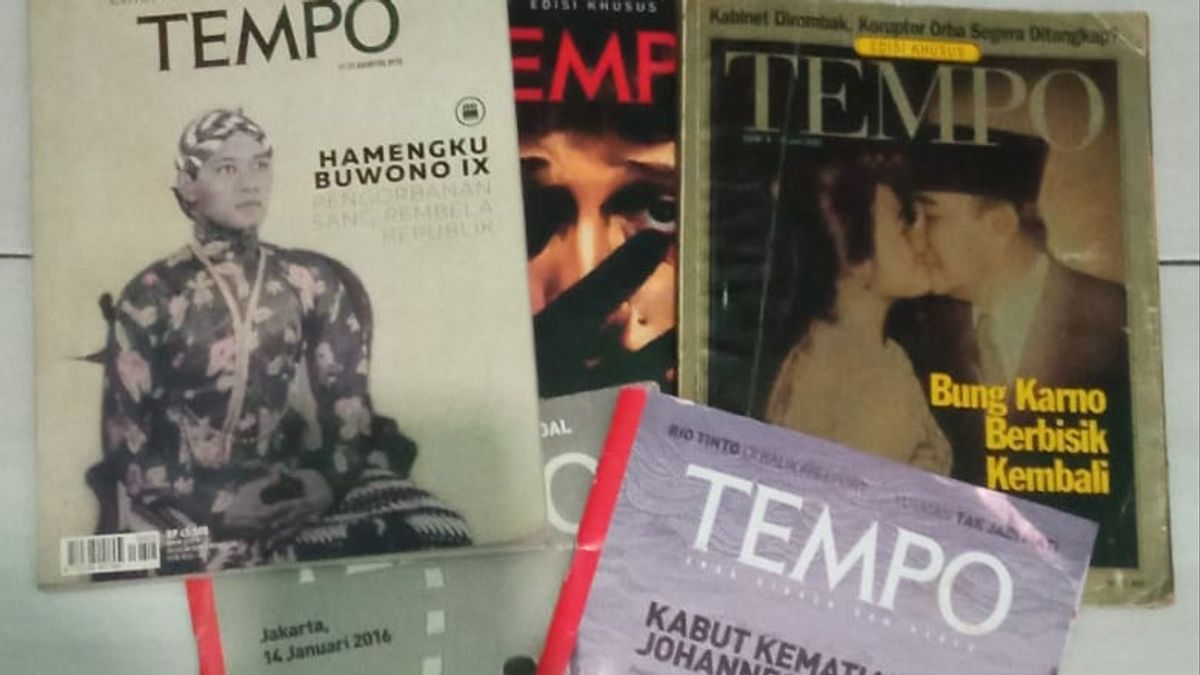JAKARTA - On March 6, 1971, Tempo magazine published its first edition. The birth of Tempo magazine originated from a negotiation between six journalists and a Ciputra businessman. Tempo had a long journey afterwards.
One day in November 1970, Goenawan Mohamad, Christianto Wibisono, and Fikri Jufri were fired from Ekspres magazine. The three of them were considered too critical of the Indonesian Journalists Association (PWI).
The three of them then devised a plan to establish a more idealistic, non-partisan news magazine. The plan was constrained by funding. They then look for investors. Gonawan Mohamad visited a senior journalist, Mochtar Lubis, to work together. Failed.
In the midst of this failure, Lukman Setiawan contacted Goenawan, Christianto and Fikri. The former Kompas journalist gave news that Ciputra, a large property entrepreneur in Indonesia, was interested in the idea of establishing this nonpartisan magazine.
Negotiations by Goenawan Cs and CiputraThrough one of its companies, PT Jaya Development Group (JDG), Ciputra contacted Goenawan Cs. The relationship between Goenawan Cs and JDG was then carried out through the Jaya Raya Foundation led by Ciputra.
The book Wars Within The Story of Tempo, an Independent Magazine in Soeharto's Indonesia (2005) written by Janet Steele explained that at that time the Jaya Raya Foundation also had plans to establish a magazine. The plan for the Jaya Raya Foundation emerged after the Governor of DKI Jakarta Ali Sadikin encouraged the foundation to establish a magazine that raised the spirit of renewal of the times.
Ali Sadikin and Ciputra do have a close relationship. Ciputra finally invited Goenawan and friends to meet him. Ciputra conducted the negotiations directly. Without delegation. Ciputra handed over Rp. 18 million to Goenawan Cs.
They agreed to share ownership of the company 50:50. Goenawan Cs will be a journalism machine. Meanwhile, the Jaya Raya Foundation provided capital. Goenawan and friends at that time also emphasized the commitment of each party that the magazine that was later founded had to be guaranteed editorial freedom. Investors' interests should not touch the magazine.
After that, the magazine was founded under the name "Tempo". The name Tempo was chosen by Goenawan Cs because it was considered neutral without implying any association with any group. Another reason was that the name was easy to pronounce.
The banning of Tempo magazineOn June 21, 1994, President Soeharto's government banned Tempo magazine. Tempo is not alone. At that time the government also banned the Editor magazine and the tabloit Detik.
The government's decision to stop publishing Tempo and the two other media was announced by the Director General of Press and Graphic Development, Ministry of Information, Subrata. At that time Subrata spoke on behalf of the Minister of Information Harmoko.
This happened after Tempo published about six reports regarding the purchase of 39 used warships from East Germany. The first article - out of the six articles-- was published on June 4, 1994.
The article was entitled Germany Has a Ship, Indonesia Has a Burden. Tempo at that time presented information that stated that the budget for the purchase of the ship had not been approved by the Minister of Finance Mar'ie Muhammad.
Tempo had tried to confirm this with related parties. No one was willing to talk, until Tempo then tracked the price of the warship, which was estimated at Rp27.5 billion.
If converted to dollars, that amount becomes 12.7 million US dollars. However, in the purchase budget proposed by the Minister of Research and Technology (Menristek) BJ Habibie, the figure reached 1.1 billion US dollars.
The Tempo publication of June 11, 1994 published six investigative articles regarding the purchase of the ship. The articles revealed that the purchase of the ship was made on Suharto's orders.
50 years of TempoTempo is now 50 years old. 50 years ago, Goenawan Mohamad wrote the introduction to the magazine's premiere:
Our journalism principle is not one-sided journalism. We believe that virtue, as well as unrighteousness, does not become a monopoly of one party. We believe that the job of the press is not to spread prejudice, but to eliminate it, not to breed hatred, but to communicate mutual understanding. The journalism of this magazine is not journalism for swearing or pouting the lips, nor is it meant to lick or serve.
TODAY'S HISTORY OthersThe English, Chinese, Japanese, Arabic, and French versions are automatically generated by the AI. So there may still be inaccuracies in translating, please always see Indonesian as our main language. (system supported by DigitalSiber.id)









